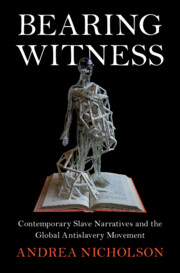Book contents
- Bearing Witness
- Slaveries since Emancipation
- Bearing Witness
- Copyright page
- Epigraph
- Contents
- Figures
- Preface
- Acknowledgments
- Introduction
- 1 A Narrated Self
- 2 “I Was Free, I Still Wasn’t Free”
- 3 The Construction and Reconstruction of Survivor Identities
- 4 Bearing Witness
- 5 Assuming “Full” Freedom
- 6 Antislavery Strategies and the Survivor as Activist
- Conclusion
- Appendix: Table of Narratives analyzed
- Bibliography
- Index
6 - Antislavery Strategies and the Survivor as Activist
Published online by Cambridge University Press: 22 September 2022
- Bearing Witness
- Slaveries since Emancipation
- Bearing Witness
- Copyright page
- Epigraph
- Contents
- Figures
- Preface
- Acknowledgments
- Introduction
- 1 A Narrated Self
- 2 “I Was Free, I Still Wasn’t Free”
- 3 The Construction and Reconstruction of Survivor Identities
- 4 Bearing Witness
- 5 Assuming “Full” Freedom
- 6 Antislavery Strategies and the Survivor as Activist
- Conclusion
- Appendix: Table of Narratives analyzed
- Bibliography
- Index
Summary
Building on the preceding chapters, it examines the survivor as activist in the context of prevention, state mechanisms, and antislavery participation. It exposes the responsibility placed on survivors for participation, the hierarchies of power that mute voice, and the limited ways in which survivors are employed. The chapter goes on to consider the antislavery strategies that survivors themselves suggest and reveal the challenges that survivors face engaging with the public sector to inform antislavery policy. The chapter includes an analysis of the extent of survivor participation in state processes and draws on analysis of the work of survivor activists.
Keywords
- Type
- Chapter
- Information
- Bearing WitnessContemporary Slave Narratives and the Global Antislavery Movement, pp. 157 - 173Publisher: Cambridge University PressPrint publication year: 2022

